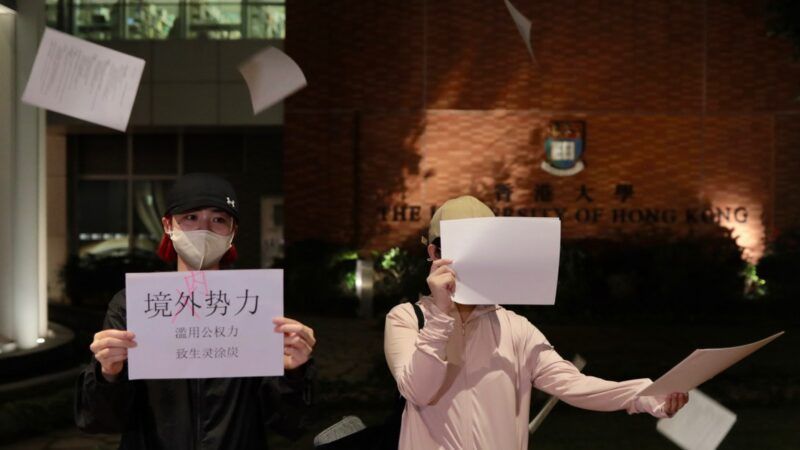China's Lockdown Protests Show Why You Shouldn't Let Government Weaken Encryption, Anonymity
Too many Western governments want to follow in the footsteps of authoritarians when it comes to tech privacy.

China's response to COVID-19 lockdown protests is thoroughly authoritarian and unsurprising. Not only are they sending police to bust up protests, but they're also attempting to track protesters' messages through social media and app communication tools.
The Wall Street Journal reports that protesters are using encrypted apps like Telegram to organize, start group chats, and communicate about possible sites to organize and avoid the police. And Chinese police, in turn, are using whatever tools they have to try to track the protesters through social media and their phones. The Journal writes:
A university student in Beijing who had participated in Sunday's protest in the city said his school had been contacted by police. The school told him police had used mobile-phone data to track his movements to the vicinity of the protests. He said he had been asked to write a declaration explaining why he was present in the area at the time.
A 19-year-old student who lives in Zhejiang Province said he was summoned by local police to come in for questioning only a few hours after he said in a group chat on a Chinese social-media platform that he planned to put up blank pieces of paper in public restrooms. Protesters have held up blank sheets of paper at demonstrations to express opposition to censorship.
The student said the police told him to take the comment down in the group chat and never do it again. "The Chinese government's control over free speech has reached an unprecedented level," he said.
China's massive surveillance state makes true privacy next to impossible, but note how hard citizens are trying anyway. There is a lesson here that Chinese citizens aren't as acquiescent with their government's expression of authority as the leadership would have us believe.
There's another big lesson here about the importance of both encryption and online anonymity, and why it's absolutely necessary to put a stop to any government attempting to undermine these tools.
End-to-end encryption keeps third parties—including governments—from reading your communications and data without your permission. The goal of this encryption is that only the sender and receiver are able to read the content. Law enforcement and government officials in many countries, including the United States, the United Kingdom, Australia, and some others, absolutely hate that this encryption exists because it also serves as an avenue for criminals to conceal from authorities what they're doing.
And so the response from these governments is to attempt to lobby for or even mandate under the law encryption backdoors. They insist that our police must have a way to get into our phones and devices in order to fight crime. There are two big problems here: There is no way to create a backdoor to encryption that only a government can access. These tools can (and do) get out into the wild or can get cracked by hackers. Then, suddenly, nobody's data are secure.
And second, as we can see in China, governments can and will use whatever data they can get their hands on for whatever purpose they desire, and that includes oppressing the rights of individuals that attempt to protest authoritarian government measures. Chinese people have to use encryption in order to avoid the otherwise all-seeing eye of the police and censors. One problem with saying that we need encryption backdoors to investigate illegal behavior is what each government decides is "illegal behavior." The law can be used to violate the right to speak out and assemble. Encrypted communications make that oppression just a little bit harder.
The BBC also noted how police in China are attempting to track which people are attending protests and searching people's phones to see what sort of apps they're using. Unsurprisingly, apps that provide encryption are banned in China. They're also, of course, devoted to trying to track down the individual identities of anybody posting on these platforms.
There are government officials in the United Kingdom who would absolutely love to follow in China's footsteps. Leaders there want to crack down on the use of online anonymity and attempt to force people to provide their names as part of using social media tools. Their justification is to try to prevent abusive and threatening speech directed toward politicians, celebrities, and athletes. That may sound more noble than what China is doing, but they are clearly looking to purge anonymity from the internet in order to punish people for saying things they don't like, not just actual threats. Some British officials have warned that regulations against only anonymity could hinder protesters and whistleblowers from speaking out. So they know the bad potential here; it's not an unpredictable side effect if they follow through with these proposals.
When British officials brought this up last fall, I noted that this won't actually purge anonymity from the internet but instead will create a black market for it. What we see now in China, where citizens are getting their hands on prohibited encrypted apps regardless of the bans, is a real-world example. Government can't actually stop people who are insistent on privately or anonymously communicating through online tools from doing so. Their attempts to do so are more likely to harm everyday people attempting to live their lives freely than to actually net them criminals.


Show Comments (32)